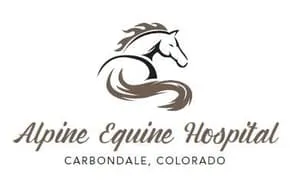The changing of the seasons will soon be upon us. Since this will be my first fall living in the Roaring Fork Valley I cannot wait to appreciate the aspens changing from green to gold and see how the snow transforms this alpine landscape. Looking forward to the changing of the seasons also marks a great time to start thinking about fall wellness care for our equine companions. We want to make sure that they are set up to fare well during the cold months ahead regardless of whether they live inside in a heated stall or out on the pasture.
Vaccination, parasite control and dental examination/teeth floating are important components of preparing our equines for winter and checking in on their general health. Today we will discuss all these components of fall wellness care to keep your horse/donkey/mule happy and healthy this winter. (In our next entry we will go into details of winter nutrition so stay tuned!)
While most of our core equine vaccinations are given in the spring, protecting your horse against Rhinopneumonitis (Equine Herpes Virus) and Equine Influenza in the fall is an important component of our yearly vaccination schedule. Each fall when horses are returning to their barns from shows, rodeos, summer pastures, or trail rides where they encounter other horses they bring the viruses they were exposed to back with them.
Since horses are often housed in closer quarters over the winter (barns, spend more time together under shelters), it is important to ensure that they are vaccinated for Equine Influenza and Herpesvirus since these viruses are easily spread from aerosolized nasal secretions and nose to nose contact. Horses that travel to competitions, are housed at barns with lots of in and out traffic, or live at facilities with broodmares and lots of horses under five years of age should be vaccinated for Equine herpesvirus and influenza (Rhino/flu) every six months. Adult previously vaccinated horses that do not live in highly trafficked areas can be vaccinated for Rhino/flu once yearly. While separate vaccines are available, in the fall we use a single vaccine that stimulates immunity against both viruses to decrease vaccine reactions.
As our horses move off the pastures and into dry lots and stalls for winter it is important to assess their parasite burden to best direct their deworming schedule. Pasture parasite burdens are greatest in the spring and fall. Performing a fecal egg count on a stool sample 12 weeks after they were last dewormed tells us if your horse is a low, moderate, or high shedder. All horses carry intestinal parasites and in low numbers they are a normal part of their intestinal flora and do not cause problems.
Low shedders only need to be dewormed 1-2 times per year with the goal of preventing their parasite load from causing clinical problems, not eliminating the parasites all together. High shedders are responsible for causing a high pasture burden and they are the individuals who should be targeted for more frequent deworming protocols. Deworming all horses as if they were high shedders causes resistance to our deworming medications, which has become a significant problem after decades of frequent dewormer use across all individuals. We recommend deworming low shedders with ivermectin in the fall to treat internal and external parasites.
Performing a thorough oral exam is especially important as our horses transition to eating less pasture and more hay in the fall and winter. Dry matter is more difficult to chew than fresh grass and any occlusal abnormalities (enamel points, steps, wave mouths, fractured teeth) can impair a horses ability to properly grind their hay, an important first step in the digestive process. Horses are very stoic and will keep eating even when severe problems are occurring in their mouths. A sedated oral exam is the best way to evaluate your equine companion’s teeth, gums and cheeks for signs of any problems.
At this time adjustments can be made with a power float and plans can be made to address any diseased teeth. Horses in their mid to late teens and above benefit from twice yearly sedated oral exams to ensure that the important chewing lifespan and function of their teeth are preserved as long as possible. Young horses (less than five years) that are losing their deciduous teeth (caps) also benefit from more frequent oral examinations to ensure that their caps are being shed properly and not causing any problems for the incoming adult teeth.
We hope that the above entry gave you more information about details of your horse’s fall wellness care. As always, the physical exam and discussion of your horse’s history since he/she was last seen are of utmost importance for helping us identify and discuss any concerns, and help ensure that your equine companion is feeling their best for years to come. Looking forward to seeing you all at the barn and out on the trails!
About the Author
Dr. Jen Kelley graduated from Colorado State University’s Doctor of Veterinary Medicine program this past May. She has lived in Colorado for most of her life and has been a horse lover from the first time she heard hoof beats. Dr. Kelley loved having the opportunity to grow up caring for her own horses and competing on the Colorado Hunter Jumper Association circuit from her home base in Littleton. She worked at Littleton Equine Medical Center as a veterinary assistant prior to attending vet school, and also spent time in California working at Quarter and Gypsy horse stud farms.
Dr. Kelley is passionate about dentistry and oral surgery and plans on becoming a boarded equine and small animal dentist, but enjoys all aspects of equine wellness and emergency care. She has owned her Gypsy Horse gelding named Sundance aka Tubb Tubb for the past nine years. They competed in pleasure driving, English pleasure and over fences classes, and he currently loves being a mountain pony and hitting the beautiful trails of the Roaring Fork Valley.
